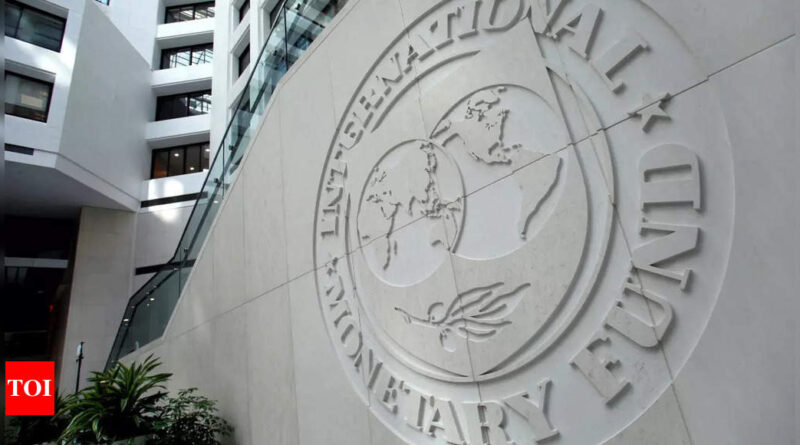Pakistan blames geopolitics for stalled IMF programme – Times of India
ISLAMABAD: Cash-strapped Pakistan has blamed geopolitics for the International Monetary Fund (IMF)’s reluctance to revive a stalled bailout programme, alleging that global institutions wanted Pakistan to default on its sovereign debt, like Sri Lanka, and then enter into negotiations with the global lender.
Addressing a parliamentary committee on finance and revenue, Pakistan finance minister Ishaq Dar said the IMF’s demand for a $6 billion guarantee on external resources was unjustified and that the IMF’s delaying plan apparently suggested a political agenda.
“Geopolitics is behind a halted loan programme so that Pakistan defaults. Foreign hostile elements want Pakistan to turn into another Sri Lanka and then the IMF negotiates with Islamabad,” Dar said.
Responding to the IMF objection to the tax exemptions given in the recently unveiled budget, the minister said Pakistan is a sovereign country and cannot accept everything from the IMF. As a sovereign country, according to Dar, Pakistan should have the right to give some tax concessions. “The IMF wants us not to give tax concessions in any sector,” he added. The minister stressed that the country would meet its obligations with or without the IMF’s bailout package.
He said no reason had been given by the IMF for the “unnecessary delay” behind the ninth (current) review, which has been pending since last November. “IMF or no IMF, Pakistan will not default,” he added.
“The tax exemptions that have been announced in the Budget are triggers of growth in the real sectors of economy. This is the sustainable path to provide employment and livelihood to the common citizen. In any case, the amount is fairly small,” a Pakistan finance ministry statement said in response to IMF criticism.
With the IMF’s EFF (extended fund facility) of $6.7 billion for Pakistan set to expire on June 30, the federal budget presented earlier this month was the last hope for the incumbent government to make grounds for revival of the IMF programme and reimbursement of a $1.2 billion instalment, part of the $6.7-billion bailout package. It didn’t take long for the IMF to raise serious objections against the budget for 2023-24. It said the government has missed an opportunity to broaden the tax base and reduce tax expenditures as well as terms of tax amnesty against the IMF’s programme conditionality. Seeking major changes in the budget, the Washington-based lender stated it stands ready to refine this budget ahead of its passage through Parliament.
It, however, seems unrealistic for the Pakistan authorities to redraft the budget, cut more subsidies and raise more taxes, and that too within a fortnight.
Without the IMF properly on board, chances of other countries, like China, Saudi Arabia and the United Arab Emirates, stepping in are also slim as all of them have made this very clear over the last few months.
It is, however, known that Pakistan’s forex reserves will fall to $2.6 billion after a $900-million payment to creditors by the month-end— just when the EFF is scheduled to end — that too if China helps by rolling over $2.3 billion of its deposits. That’s less than a two-month import cover, and about 10 times less than the $23 billion owed in one fiscal year.
Addressing a parliamentary committee on finance and revenue, Pakistan finance minister Ishaq Dar said the IMF’s demand for a $6 billion guarantee on external resources was unjustified and that the IMF’s delaying plan apparently suggested a political agenda.
“Geopolitics is behind a halted loan programme so that Pakistan defaults. Foreign hostile elements want Pakistan to turn into another Sri Lanka and then the IMF negotiates with Islamabad,” Dar said.
Responding to the IMF objection to the tax exemptions given in the recently unveiled budget, the minister said Pakistan is a sovereign country and cannot accept everything from the IMF. As a sovereign country, according to Dar, Pakistan should have the right to give some tax concessions. “The IMF wants us not to give tax concessions in any sector,” he added. The minister stressed that the country would meet its obligations with or without the IMF’s bailout package.
He said no reason had been given by the IMF for the “unnecessary delay” behind the ninth (current) review, which has been pending since last November. “IMF or no IMF, Pakistan will not default,” he added.
“The tax exemptions that have been announced in the Budget are triggers of growth in the real sectors of economy. This is the sustainable path to provide employment and livelihood to the common citizen. In any case, the amount is fairly small,” a Pakistan finance ministry statement said in response to IMF criticism.
With the IMF’s EFF (extended fund facility) of $6.7 billion for Pakistan set to expire on June 30, the federal budget presented earlier this month was the last hope for the incumbent government to make grounds for revival of the IMF programme and reimbursement of a $1.2 billion instalment, part of the $6.7-billion bailout package. It didn’t take long for the IMF to raise serious objections against the budget for 2023-24. It said the government has missed an opportunity to broaden the tax base and reduce tax expenditures as well as terms of tax amnesty against the IMF’s programme conditionality. Seeking major changes in the budget, the Washington-based lender stated it stands ready to refine this budget ahead of its passage through Parliament.
It, however, seems unrealistic for the Pakistan authorities to redraft the budget, cut more subsidies and raise more taxes, and that too within a fortnight.
Without the IMF properly on board, chances of other countries, like China, Saudi Arabia and the United Arab Emirates, stepping in are also slim as all of them have made this very clear over the last few months.
It is, however, known that Pakistan’s forex reserves will fall to $2.6 billion after a $900-million payment to creditors by the month-end— just when the EFF is scheduled to end — that too if China helps by rolling over $2.3 billion of its deposits. That’s less than a two-month import cover, and about 10 times less than the $23 billion owed in one fiscal year.




